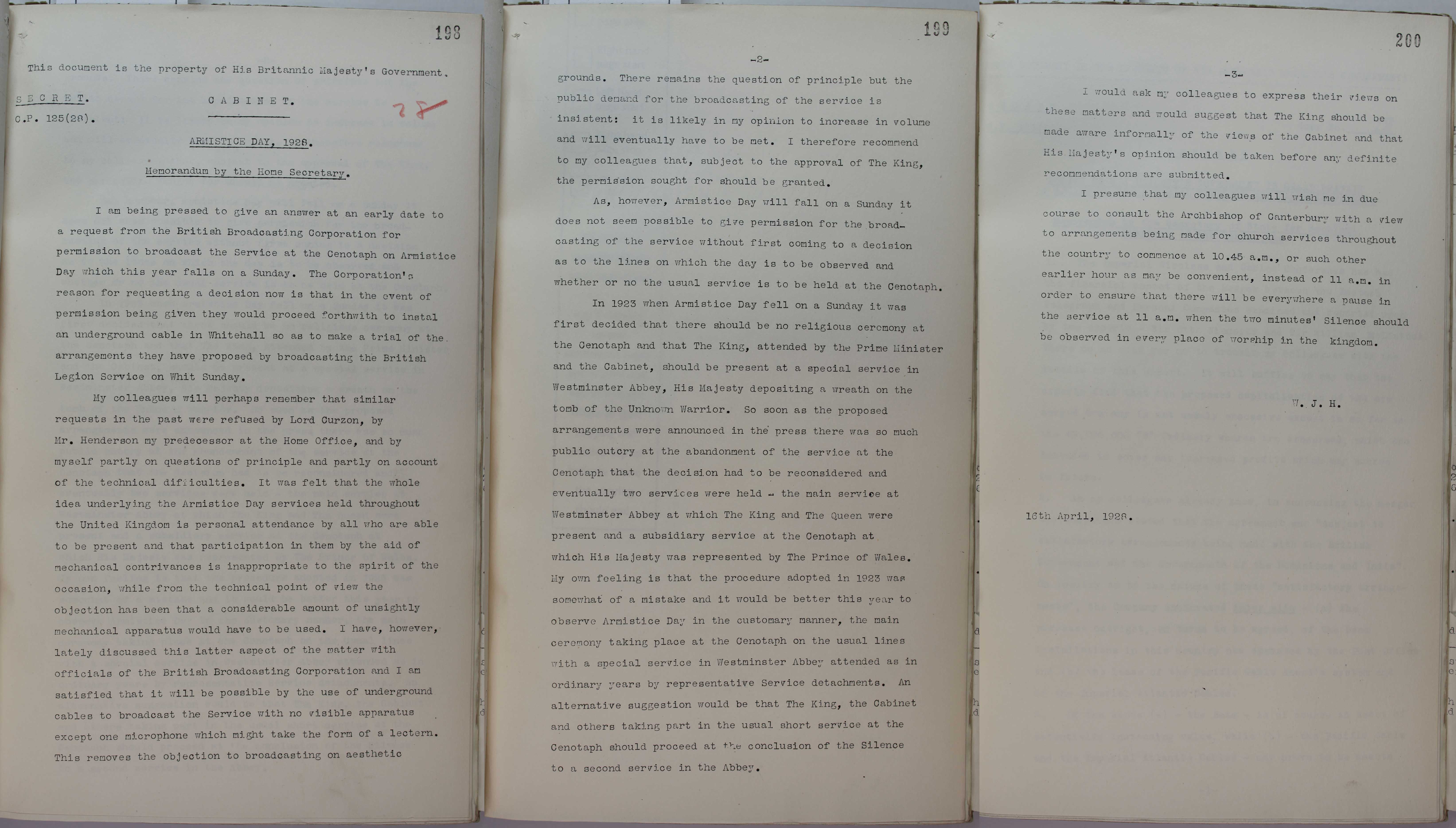Memorandum from William Joynson-Hicks, Home Secretary, concerning the commemoration of the Armistice and the BBC, 16 April, 1928 (Catalogue ref: CAB 24/194)
Transcript
This document is the property of His Britannic Majesty’s Government
SECRET C A B I N E T
C.P.125 (28)
ARMISTICE DAY, 1928
Memorandum by the Home Secretary
I am being pressed to give an answer at an early date to a request from the British Broadcasting Corporation for permission to broadcast the Service at the Cenotaph on Armistice Day which this year falls on a Sunday. The Corporation’s reason for requesting a decision now is that in the event of permission being given they would proceed forthwith to install an underground cable at Whitehall so as to make a trial of the arrangement they have proposed by broadcasting the British Legion Service on Whit Sunday.
My colleagues will perhaps remember that similar requests in the past were refused by Lord Curzon, by Mr. Henderson my predecessor at the Home Office, and by myself partly on questions of principle and partly on account of the technical difficulties. It was felt that the whole idea underlying the Armistice Day Services held throughout the United Kingdom is personal attendance by all who are able to be present and that participation in them by aid of mechanical contrivances is inappropriate to the spirit of the occasion, while from the technical point of view the objection has been that a considerable amount of unsightly mechanical apparatus would have to be used. I have, however, lately discussed this latter aspect of the matter with officials of the British Broadcasting Corporation and I am satisfied that it will be possible by the use of underground cables to broadcast the Service with no visible apparatus except one microphone which might take the form of a lectern. This removes the objection to broadcasting on aesthetic grounds. There remains the question of principle but the public demand for the broadcasting of the service is insistent: it is likely in my opinion to increase in volume and will eventually have to be met. I therefore recommend to my colleagues that, subject to the approval of The King, the permission sought ought to be granted.
As, however, Armistice Day will fall on a Sunday it does not seem possible to give permission for the broadcasting of the service without first coming to a decision as to the lines on which the day is to be observed and whether or no the usual service is to be held at the Cenotaph.
In 1923 when Armistice Day fell on a Sunday it was first decided that there should be no religious ceremony at the Cenotaph and that the King, attended by the Prime Minister and the Cabinet, should be present at a special service in Westminster Abbey, His Majesty depositing a wreath on the tomb of the Unknown Warrior. So soon as the proposed arrangements were announced in the press there was so much public outcry at the abandonment of the service at the Cenotaph that the decision had to be reconsidered and eventually two services were held- the main service at Westminster Abbey at which The King and The Queen were present and a subsidiary service at the Cenotaph at which His Majesty was represented by The Prince of Wales. My own feeling is that the procedure adopted in 1923 was somewhat of a mistake and it would be better this year to observe Armistice Day in the customary manner, the main ceremony taking place at the Cenotaph on the usual lines with a special service in Westminster Abbey attended as in ordinary years by representative Service detachments. An alternative suggestion would be that The King, the Cabinet and others taking part in the usual short service at the Cenotaph should proceed at the conclusion of the Silence to a second service in the Abbey.
I would ask my colleagues to express their views on these matters and would suggest that The King should be made aware informally of the views of the Cabinet and that His Majesty’s opinion should be taken before any definite recommendations are submitted.
I presume that my colleagues will wish me in due course to consult the Archbishop of Canterbury with a view to arrangements being made for church services throughout the country to commence at 10.45 a.m., or such other earlier hour as may be convenient, instead of 11 a.m. in order to ensure that there will be everywhere a pause in the service at 11 a.m. when the two minutes’ Silence should be observed in every place of worship in the kingdom.
16th April, 1928 W.J.H. [William Joynson-Hicks]
